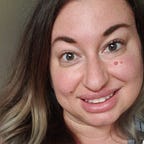Leaving blonde behind
I have always had a complicated relationship with my hair — my identity became wrapped up in its colour.
My mother is Danish. She has a stereotypical Scandinavian appearance — porcelain complexion, bright blue eyes, and naturally white-blonde hair. My father’s lineage is more ambiguous. He has dark skin, black hair and dark brown eyes, and no real idea where his family comes from.
I got a little of both my parents. I have pale white skin that darkens to a deep tan in the sun without burning — unlike my mother’s that turns immediately to lobster-red. I have dark eyes and eyebrows like my father, but, for a time, I had my mother’s white-blonde hair. I inherited the colour from her, but the texture from my father — thick and coarse.
My father’s ideal standard of beauty clearly was, and still is, my mother. He would continually speak of blonde-haired women as beautiful, extolling the virtues of flaxen-haired celebrities like Marilyn Monroe, Claudia Schiffer, and Christie Brinkley. He valued beauty so very much, and my appearance was overly important to him. He equated beauty with success, and as a result, so did I.
My hair started to darken as high school wore on — from white blonde to golden blonde and then to an ashy colour that I would best describe as mousey. I started to dye it — preserving the vestiges of my youth and perceived beauty. I coloured it with boxed bleach every six weeks for more than a decade.
Blonde was my identity.
When people would try to find me in a crowd, they’d look for “the blonde one.” That’s how they described me: “You know Kristy — the girl with the long blonde hair.” It appeared in my MSN Messenger screen names or the e-mail addresses of my youth — platinumblonde18 or blondiebabe24 or something equally as superficial and ridiculous. I couldn’t separate myself from my hair colour.
I dabbled in brown hair once in my junior year, bowing to the pressure of friends who said I’d look better, more natural, with hair that suited my skin tone. My father was not impressed. He reminded me that beautiful women were blonde, that his daughter should be beautiful and blonde too. He said perhaps my friends were jealous, perhaps they had suggested I dye my hair so that I was less attractive, as part of some sort of reverse psychology. I was devastated and bleached it out the next day. I needed his approval, and my blonde hair seeemed like a way to get that.
I was thirty before I let go. I sat in the hairdresser’s chair, refusing to acknowledge the brittle, broken mess in her hands, claiming it was healthy. She said it looked like a rocker mullet. She was being nice. The hair around my crown was just over an inch long while the remainder hung well past my shoulders. Fifteen years of self-bleaching had taken its toll.
I refused to give up on being blonde, but I did concede that it was healthier to have a professional bleach it, rather than to do it myself. We agreed to go slightly darker, to make it a little healthier — just to help the crown grow — then we’d go platinum again.
When it was done, I cried. It was too dark. I was no longer platinum blonde. It was ashier, less striking, more generic. I was miserable for days before I broke down and went back. I was no longer beautiful. I would never be successful in life. I wasn’t me anymore. We bleached it again.
I love my hairdresser for her patience. She never once shamed me for having an intrinsic attachment to my hair colour. Slowly, I became braver and braver, looking back on photos of my horrific blonde dye job, sometimes yellow-or orange-tinged, sometimes missing a chunk at the back that betrayed my status as a suicide blonde — dyed by my own hand. I gradually came to prefer the photos of myself with darker hair and it became an awakening of sorts, a realization that perhaps my self-worth shouldn’t be entirely defined by the colour of my hair.
Still, every time I made a change, every time I agreed to a light balayage or a root fade, I’d preface it with a question:
“This will be easy to make blonde again, right?”
“We can turn it back easily if I decide I want to be blonde again, can’t we?”
One day, on a whim, I decided to turn it pink. I received assurance from my hairdresser that it would only last a few weeks, that it was semi-permanent, that it would fade back to the platinum I knew and loved.
Having pink hair was freeing. It allowed me to express myself in another way, to rip the band-aid off and detach radically from the burden of blonde.
My hair is long now. Healthy again. Shiny. Thick and almost at my waist. Last time I was at the hairdresser, I asked to have it coloured one shade darker than the last time. She smiled at me, knowing we had turned a corner.
There are still days I flip through magazines and yearn for the icy hue of my former hair. I’ll probably never be blonde again, and that’s okay. At this point in my life, I can safely say I’ve left the bleach behind. I no longer tie my self-worth to someone else’s standard of beauty. I certainly don’t equate my hair with my potential for success. And my identity is no longer tied to being blonde.
